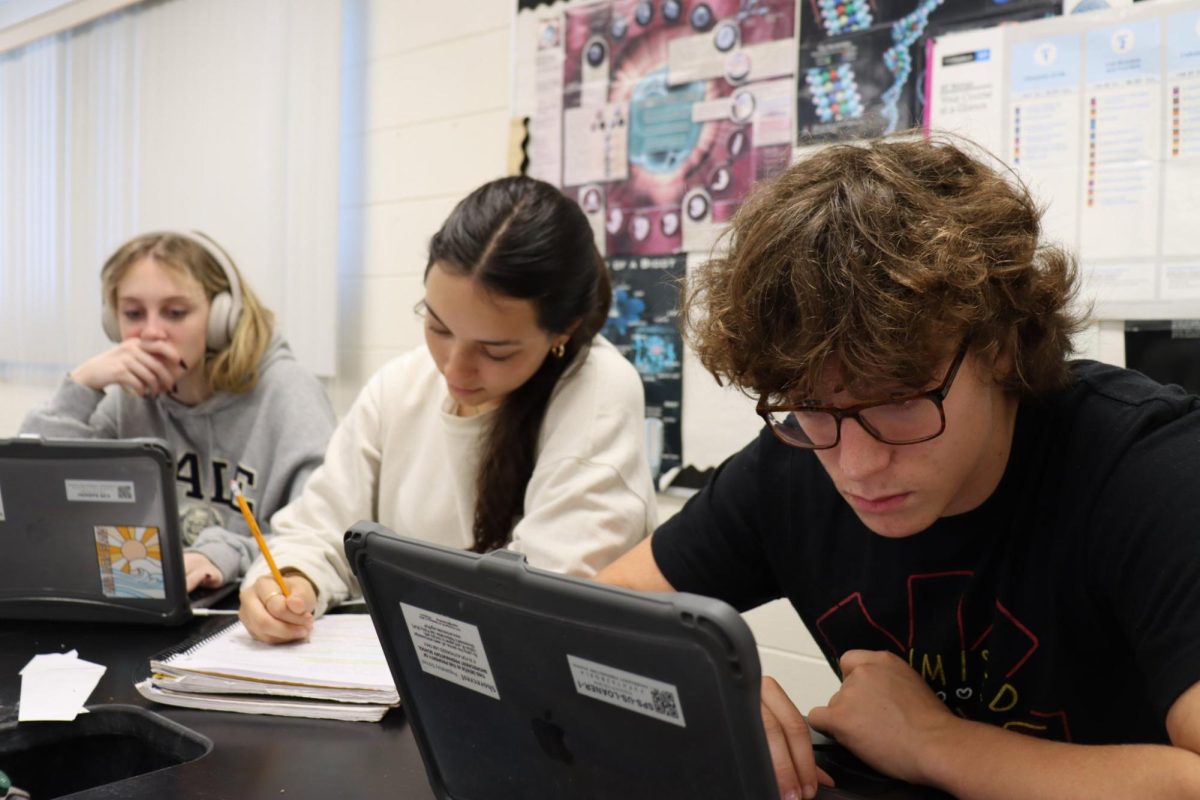
Cole Oman
Juniors Kaelie Dieter, Luna Gillis, and Charlie Cowan (left to right) study intensely in US Science Teacher Summer Slater’s classroom. These juniors are in the final stretch of the school year, balancing studying for their AP exams and maintaining their GPAs.
It’s that time of year: spring break has fizzled out, we’re inching closer and closer to the end of the school year, and AP and final exams loom ahead, rumbling like a thunderstorm on the horizon—dark, ominous, and impossible to outrun. In today’s college-obsessed environment where so much emphasis is placed on our grades, just the thought of these tests can make any student break into a cold sweat.
Unfortunately, these conditions can concoct the perfect recipe for prime burnout.
We’ve all heard the term, but what exactly is burnout?
“[Academic burnout] is when students lose their focus and motivation to learn and perform well,” said US Learning Specialist Jennifer Hart. “They’re tired and just done.”
If you are finding yourself exhausted, struggling to drag your feet to school, and your grades are slipping, you may be falling victim to burnout.
Junior Lily Davila is no stranger to academic burnout. Between three AP classes and her job as a soccer coach at the YMCA, her schedule is alarmingly packed. “I’ve been having a hard time trying to juggle shifts at work, and then I have to go home and study for my classes,” she said. Davila gets three to four hours of homework done per night and goes to bed around 12-1 a.m.
This feeling of “so much work, so little time” can be incredibly frustrating. “I feel like I’m running on autopilot. Usually, I like to go home. I like to relax. I like to spend time with my family. I want to walk my dogs, but I literally can’t, because I have so much work to do,” said Davila.
Burnout is inevitable with such busy schedules, and it’s an obstacle many students face. So, how can we avoid it and power through exams?
There’s no simple fix-all solution, but there are ways to combat it, like catching enough Z’s.
“I know that many students I speak to don’t get enough sleep just in a regular week, so particularly when they’re feeling burnt out, an appropriate amount of sleep [is essential],” said Dr. Hart.
According to the University of Pennsylvania Perelman School of Medicine, sleep is pivotal for improving focus, retaining memories and information, and enhancing overall cognitive function. Teens need eight hours of sleep in order to function properly.
Yet, according to a recent survey involving 94 participants, 66 percent of Shorecrest students don’t get enough of it. 46 percent of the surveyed students said they get 6-7 hours of sleep per night with 20 percent reporting even less than that.
Another factor that contributes to burnout is time management, which many students struggle with as well.
“Staying organized and planning ahead absolutely helps,” said Dr. Hart. “We can often get overwhelmed by very large projects or year-long essays or research papers, so breaking big things into smaller steps will help and give you a sense of accomplishment.”
Sophomore Will Farley agreed. “For me personally, the hardest part about doing my work is getting started,” he said. Farley recommends the Pomodoro technique for getting work done when you’re feeling unmotivated.
This method includes working in 25-minute increments with short breaks in between. By following this method, Farley believes, you can “allow yourself a little leniency while doing your work,” but still be able to maximize focus and productivity.
Lastly, Dr. Hart recommends eating well and making sure to exercise. “What I mean
by that is eating enough and also eating things that will give you energy—something nutritious—and then even exercising. I know it sounds strange, but the more we exercise, the more energy we have to use throughout the day.”